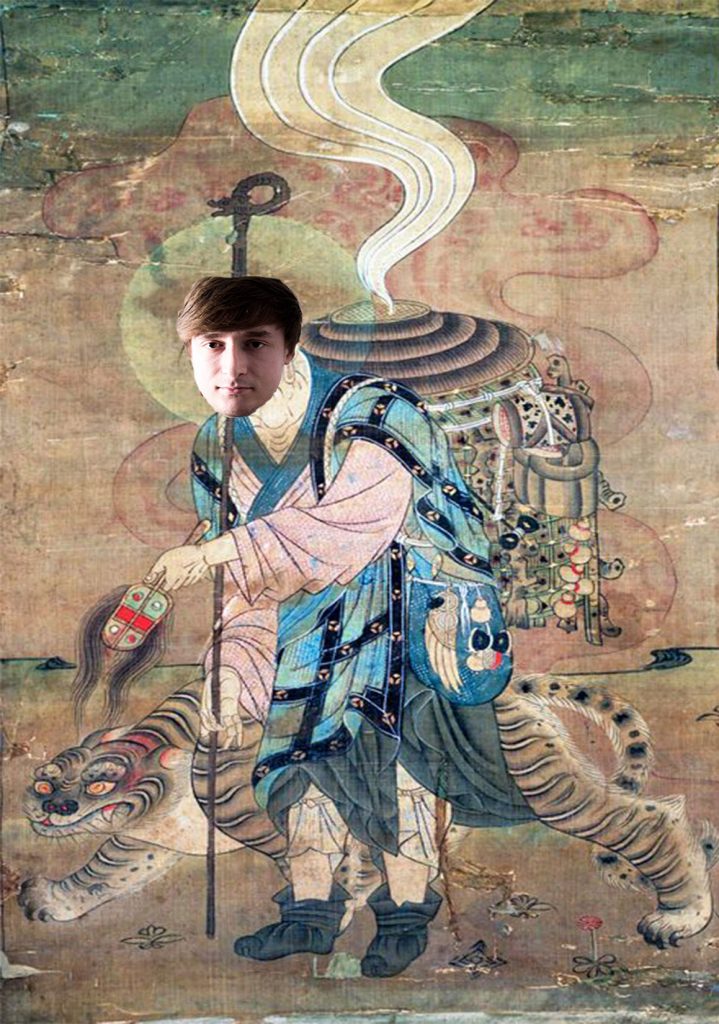 Luoyang 673 C.E.
Luoyang 673 C.E.
Xuan Li knelt in his childhood home staring blankly at the page he could not bring himself to write upon. Xuan Li had traveleded for almost twenty years and had planned on documenting his journey. Additionally he was spending his time translating the numerous Buddhist texts he had purchased in India into Chinese. At the Longmen grottoes Xuan Li was carving the rocks into further accounts of his story, the one thing he did not want was for his experiences to be lost to history. He was back in his home town Luoyang, and he knew he would remain there at the confluence of the Lou and Yellow rivers until the day he died. Again staring back at the blank page Xuan Li thought back to the beginning of his story. Xuan Li was able to specify eight moments in time during which he had reflected on his most recent travels. He decided that these were the best moments to write about in order to convey his story, his struggles, and in a sense his life the most effectively. The next eight passages convey that story.
Luoyang 630 C.E.
Xuan Li was born in the springtime 630 C.E. He was the third child of his parents who were moderately wealthy farmers. They had received a prosperous plot of land, just outside the city of Luoyang, under the Tang equal field system and had farmed it well. Their mulberry tree orchards were also especially prosperous[1]. Therefore overall his family was more well off than the average Tang farmer but by no means wealthy. While maintaining Confucian tradition, Xuan Li’s parents practiced Chan Buddhism. The form of Mahayana Buddhism which was currently thriving in China. While neither of his parents were monks they were knowledgable enough and had even helped construct a statue of the Buddha on their land[2]. They had originally built the Buddha statue with money and support from the Sui dynasty, as the Sui had been the first to support Buddhism and had funded the construction of similar statues across the country. This would be Xuan Li’s childhood home, until his travels began. He had two older siblings already, and he would eventually have another baby sister. His family was warm and loving, he would always regret leaving them and spending his life traveling without them.
Luoyang 645 C.E.
Xuan Li had a happy childhood. He knew he wanted to pursue greater things and to eventually become a Buddhist monk but for now was simply enjoying childhood and working on his families farm. He practiced certain rituals but did not fully dedicate himself in anyway to the rigors of Chan Buddhism. Chan Buddhism was an intense, serious, and tough minded approach which would require dedication and resolve[3]. All of that changed when Xuanzang returned from his travels. Xuanzang was originally from Luoyang and had left on his travels in 629 C.E. his return to China, from India was exactly the kind of news and inspiration that Xuan Li needed. Xuan Li spoke to his parents and with their blessing began studying intently copies of the translations of Buddhist texts that Kumarajiva had begun translating into Chinese in 401 C.E.[4]. But Chan Buddhism does not rely on the words and scriptures and soon Xuan Li needed more. He went to the Shao-lin Monastery where Bodhidharma had spent many years teaching. This was the closest monastery and was located on the Yellow river near Luoyang[5]. There Xuan Li studied and practiced until he became a novice monk.
Chang’an 652 C.E.
In 652 Xuan Li decided to begin his travels by moving on to study in Chang’an. The city was perhaps the most glorious one in the world. It contained people from all over the world and would enable Xuan Li to plan out his journey and perhaps start it by going out along the silk road. The city was home to five-hundred thousand people who lived within the Tang city walls with the imperial palace in the north side of the city and two markets on the southern ends. Buddhist and Daoist temples were scattered throughout the city and Xuan Li spent his time between these places learning what he could[6]. Xuan Li did not stay for very long though once he became a full monk, or Bhiksu, he began to prepare for his journey. He began to amass silk and other valuables to sell along his journey to ensure that he would have enough funds to reach home.
Turfan 655 C.E.
As the sun rose Xuan Li first spotted the tallest buildings in Turfan. Xuan Li had plenty of valuables but had almost starved on the journey. Eventually the traders who he was traveling with stopped selling him food, as their own stores of food ran low. But arrival at the city meant he would be able to trade for food within the city. Xuan Li had never seen anything like this city before in his life. Having never been outside of his home city Luoyang, and the capital Chang’an before even just the desert landscape had been exciting and new, but now as Turfan rose out of the horizon Xuan Li was overwhelmed with newness all over again. As much as he tried to blend in Xuan Li could not. He had a cart of valuables like many of the merchants but they all identified him as far from home. The vast majority of the traders only operated in small loops close to home[7]. Xuan Li had taken valuables to fund his journey. But what he carried most was rolls of silk. This unique trading item could be used as currency across the silk road and throughout India[8]. While Turfan intrigued Xuan Li his true religious goals lay to the south and through the mountain passes ahead.
Ferghana 659 C.E.
In 659 C.E. Xuan Li entered the town of Ferghana which had been recently taken by the Tang military as a military protectorate in the same year. Ferghana is nestled within the mountains along the southern route of the silk road. It is the gateway to the mountain passes which lead down through the mountains into India. Ferghana was an important stop over point for Sogdian traders from Samarkand who traveled the furthest of all silk road traders. The intended destination for their goods were the southern markets of Chang’an[9]. Ferghana had historically been a point at which Indian kingdoms had forced silk road merchants to pay tolls. But now under the control of the Tang dynasty Xuan Li was able to use the pass to his own advantedge.
Ceylon 664 C.E.
Xuan Li had made it. He had crossed all of India often following the path of the legendary Faxian[10]. After spending time to learn one of the more common the local languages, Apabhramśa, Xuan Li’s journey had become much easier. Equipped with language skills Xuan Li was able to experience more forms and practices of Mahayana Buddhism, learning about various bodhisattvas, and purchasing many ancient Buddhist texts[11]. On one particularly long journey he had stopped to drink water in a small stream. Xuan Li viewed that as a mistake soon after because for the next three days and nights he was extremely sick to his stomach. He moved on in his journey but he never truly felt healthy again after that. After spending many years traveling the country, Xuan Li had found himself at the very southern tip of the continent, and had proceeded to Ceylon or Sri Lanka. There he would find one of the final goals of his journey, a tall jade statue of the Buddha mentioned by Faxian. Xuan Li carefully bestowed the seven treasures to the statue, namely gold, silver, lapis lazuli, crystal, coral, pearls, and agate. He had been collecting these treasures for years. The last of the seven he collected were the pearls as Sri Lanka was one of the few places in the world you could trade for them[12]. Xuan Li felt very accomplished after completing those rituals. But now he began to feel homesick.
Guangzhou 670 C.E.
Xuan Li was incredibly glad to step off of this ship. After spending years in India Xuan Li had been increasingly homesick. But if he had known what it would take to get home he might never have boarded the ship. Xuan Li had spent most of the rest of his valuables and silk on Buddhist texts in Ceylon and lastly on permission to board the Chinese merchant ship that would take him back to China. What he was not happy to find was that he was crammed in with hundreds of other passengers. Xuan Li had been incredibly nervous because the previous ship that had sailed this route had been lost at sea. And his ship had encountered rough seas and a storm. So he was incredibly grateful when the ship docked in Guangzhou[13]. Xuan Li was returning home.
Luoyang 671 C.E.
Xuan Li had spent over twenty years of his life traveling west across the silk road, south into India, and then north across the South sea all to return home a changed man. He had followed the example and pathways of Faxian and Xuanzang, his travels had been his life but that part of his life was over[14]. But, it felt good to have returned home, even after having dedicated his life to such high and lofty goals. Xuan Li decided that he would stay home and translate his ancient texts and write his memoirs. Ever since he had drank the tainted water in India Xuan Li had felt sick. In Luoyang he had confirmed it was a parasite and that it would kill him. But Xuan Li had lived a full life and he was okay with that. For years he had felt death approaching, but who knows when that would come, but when it did it would mean the true end to his travels.
Notes
[1] Valerie Hansen, The Open Empire; A History of China to 1800, New York W.W. Norton & Company, Inc, 2015, 195.
[2] Hansen, Open Empire, 183.
[3] John E. Wills, Mountain of Fame; Portraits in Chinese History, Princeton, Princeton University Press, 1994, 114.
[4] Hansen, Open Empire, 151.
[5] Wills, Mountain of Fame, 118.
[6] Hansen, Open Empire, 184.
[7] Hansen, Open Empire, 152.
[8] Hansen, Open Empire, 155.
[9] Hansen, Open Empire, 189.
[10] Hansen, Open Empire, 152.
[11] Wills, Mountain of Fame, 116
[12] Hansen, Open Empire, 155.
[13] Hansen, Open Empire, 152.
[14] Hansen, Open Empire, 152.
